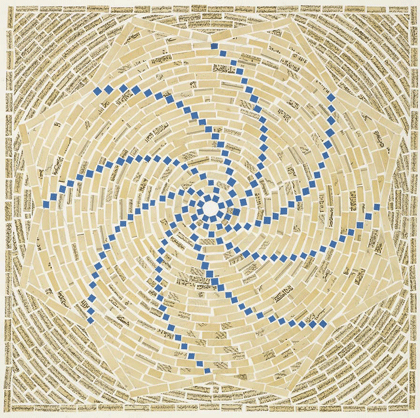Y.Z. Kami
21 Nov 2008 - 11 Feb 2009
Y.Z. KAMI
"Endless Prayers"
21 November 2008 – 11 February 2009
In his first one-person exhibition in a UK institution, Y.Z. Kami shows two group of works that he has created during the past twelve years.
The most striking works are without doubt Y.Z. Kami’s large, frontal painted portraits of ordinary people, each of whom fills its canvas, often measuring three metres by two metres. Despite their imposing size and intense presence these portraits are neither flattering nor psychological; rather, they depict the subjects as they are, absorbed in their own world. This characteristic, together with their fresco-like quality, executed using a special painting technique, endows the images with a certain lack of materiality resembling that of the Fayum portraits which were painted to accompany Egyptian mummies in their graves. In some of the paintings the eyes of the subjects are closed, but in others they are open and they gaze either inwardly or at a fixed point in the distance. In most cases it is difficult to establish eye contact and each painted figure seems to carry its own distinct history within itself.
The exhibition also features Y.Z. Kami’s works on paper, entitled Endless Prayers. These are made by gluing countless minute brick-shaped cut-outs from poetry and prayer texts on to the canvas in circular arrangements or according to some Islamic architectural detailing of domes. The spiraling patterns are inspired by the whirling motions in the rituals of dervishes found in the Mawlavi order of Sufism, who profess that the act of spinning undoes the ego, cleanses them of the self and finds the sole unity of God. The Mawlavi order of Sufism was apparently founded by the thirteenth-century Persian poet Rumi, whose poetry has played an important role in Y.Z. Kami’s work since he began studying it as a young man. The work entitled Konya, 2007, was made in homage to the poet and bears the name of the town where Rumi spent his last years of life, died and has his mausoleum.
Y.Z. Kami was born in 1956 in Tehran, Iran, and now lives and works in
New York.
Supported by Arts council, England
"Endless Prayers"
21 November 2008 – 11 February 2009
In his first one-person exhibition in a UK institution, Y.Z. Kami shows two group of works that he has created during the past twelve years.
The most striking works are without doubt Y.Z. Kami’s large, frontal painted portraits of ordinary people, each of whom fills its canvas, often measuring three metres by two metres. Despite their imposing size and intense presence these portraits are neither flattering nor psychological; rather, they depict the subjects as they are, absorbed in their own world. This characteristic, together with their fresco-like quality, executed using a special painting technique, endows the images with a certain lack of materiality resembling that of the Fayum portraits which were painted to accompany Egyptian mummies in their graves. In some of the paintings the eyes of the subjects are closed, but in others they are open and they gaze either inwardly or at a fixed point in the distance. In most cases it is difficult to establish eye contact and each painted figure seems to carry its own distinct history within itself.
The exhibition also features Y.Z. Kami’s works on paper, entitled Endless Prayers. These are made by gluing countless minute brick-shaped cut-outs from poetry and prayer texts on to the canvas in circular arrangements or according to some Islamic architectural detailing of domes. The spiraling patterns are inspired by the whirling motions in the rituals of dervishes found in the Mawlavi order of Sufism, who profess that the act of spinning undoes the ego, cleanses them of the self and finds the sole unity of God. The Mawlavi order of Sufism was apparently founded by the thirteenth-century Persian poet Rumi, whose poetry has played an important role in Y.Z. Kami’s work since he began studying it as a young man. The work entitled Konya, 2007, was made in homage to the poet and bears the name of the town where Rumi spent his last years of life, died and has his mausoleum.
Y.Z. Kami was born in 1956 in Tehran, Iran, and now lives and works in
New York.
Supported by Arts council, England

